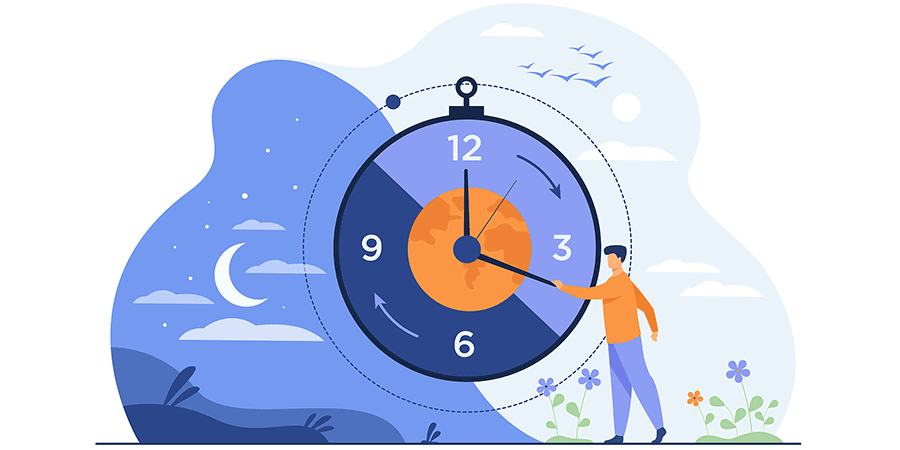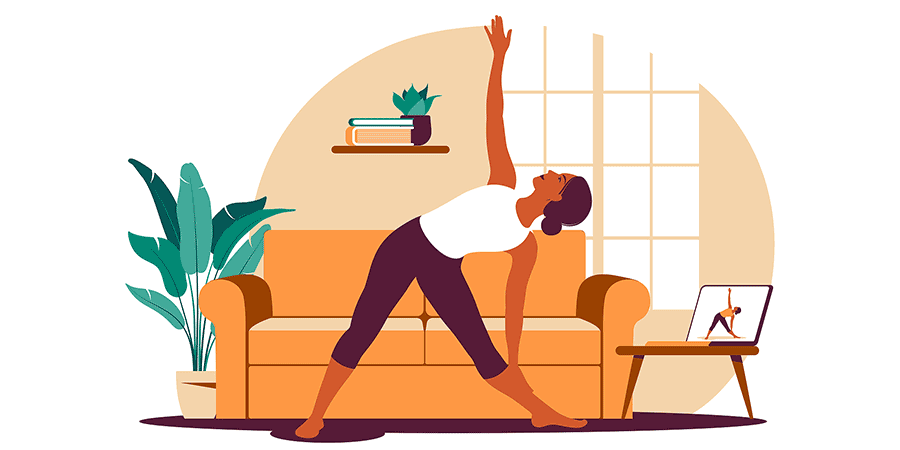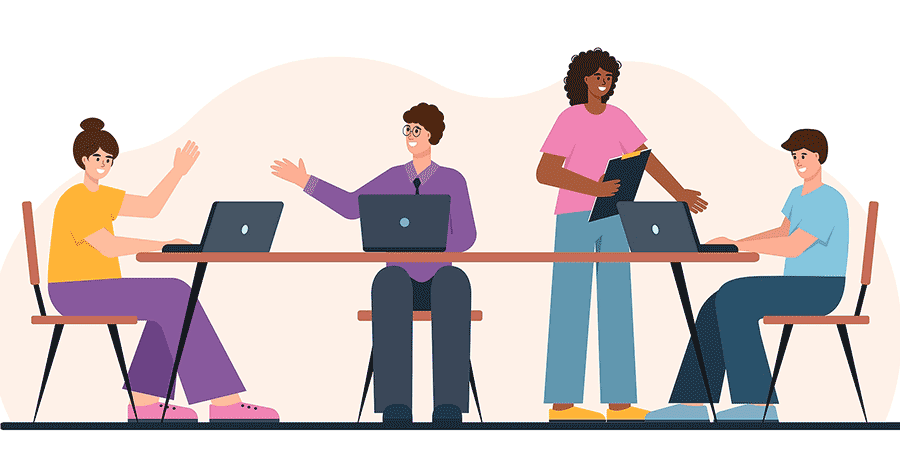- Due to the pandemic, nearly half of the American workforce now works from home.
- Working from home comes with plenty of benefits, but there are some drawbacks to consider before switching to full-time or even part-time remote work.
- We’re sharing five strategies that can support your mental wellness while working remotely.
According to the United States Bureau of Labor Statistics, 42 percent of Americans worked from home in 2020, up from 22 percent in 2019. The COVID-19 pandemic triggered this cultural and economic shift — and in all likelihood, the change is here to stay.
Last year, a global research and advisory firm Gartner, found in a survey that more than 8 in 10 company leaders intend to allow employees to continue working at least some of the time remotely, even as employees head back to the office. But while many celebrate the ability to clock in at home, others warn about possible drawbacks to the WFH (“work from home”) lifestyle. Most notably: the impact of remote jobs on employees’ mental health.
Keep reading to learn about how you can keep your mental wellbeing in check whether you work from home one day a week or Monday through Friday.
The Pros and Cons of Working Remotely
Working from home sounds cushy at first glance, and the research does reveal several benefits to the pandemic-era trend.
For instance, 2020 jobs market data from CNBC and Survey Monkey found that remote employees reported greater levels of happiness and job satisfaction—thanks in part, experts say, to better productivity, a reduced commute, and more time to spend with family. Additional survey data from FlexJobs found that people who don’t have flexible work options, including the ability to work remotely, were nearly twice as likely to report poor mental health.
People working from home also earn about 8.3 percent more money than non-remote workers doing the same job with the same level of experience, according to PayScale.
Plus, research suggests remote work is good for employers (because it enhances productivity and helps attract and retain talent) and may even be good for the environment (primarily because it cuts down on commuter traffic). Of course, working from home also promotes social distancing, which public health officials say is beneficial for pandemic mitigation efforts.
But there are some drawbacks. For instance, a new study published in July 2021 by the University of Chicago found that working from home is actually associated with a decrease in productivity—by as much as 19 percent. And not all workers report better mental health, either.
Why? Because of social isolation.
In a March 2020 interview, Stanford University economist Nick Bloom said that employees who opted to return to the office after spending nine months working at home felt “isolated, lonely and depressed at home.”
He continues: “I fear an extended period of working from home will not only kill office productivity but is building a mental health crisis.”
To summarize, there are pros and cons to working from home, but they can vary from person to person. So, it’s helpful to be aware of how remote work impacts you personally.
5 Tips for Taking Care of Your Mental Health While Working Remotely
Mental health includes our emotional, psychological, and social wellbeing—all of which help determine how we handle stress, perform at work, relate to others, and manage our overall health at any stage of life.
If you’re experiencing mental health problems since working from home, here are five ideas that could help:
Tip 1: Create a Routine
A routine keeps you disciplined, focused, and organized. It gives you the mental benefit of having a specific “start” and “end” to your workday. It also spares you the stress of losing paperwork, forgetting important tasks, and missing scheduled meetings or phone calls.
Creating a set routine may also help your productivity since you’ll have specific time windows to complete various work tasks.
Keep these tips in mind when creating a routine:
- Wake up and go to bed at the same time every day
- Pick a time of day to start and end work—and stick with it (if necessary, get input on this from your supervisor or team)
- Schedule time for breaks
- Let other people in your household know about your routine (so they’ll know when you’re off-limits for anything other than a true emergency)
Tip 2: Impose Space-Based and Time-Based Boundaries

So, set work-related boundaries in your home that consider both time and space. For example:
- Keep certain areas of your home, work-free (e.g., bedroom, bathroom, back patio, kids’ rooms, etc.).
- Keep certain times of your day work-free (e.g., no work-related activities between the hours of 8 p.m. and 8 a.m.).
Tip 3: Give Your Home Office An Upgrade
You don’t have to invest much money to make meaningful upgrades to make your daily work tasks easier and more enjoyable. Even placing an indoor plant near your workspace could be enough to reduce work-related stress.
Other ideas for home office upgrades include:
- An adjustable standing desk
- A power strip
- Brighter lighting
- Extra-long phone charger
- Noise-canceling headphones
- Comfortable, ergonomic chair
- A second monitor for your laptop
If you can, move your office into a room with a closable door.
Tip 4: Prioritize Physical Health
According to the National Institutes of Health (NIH), eating healthy whole foods, avoiding excessive alcohol and substance use, and getting enough sleep and exercise are proven ways to boost mental wellness, according to the National Institutes of Health (NIH). So, make sure you have a consistent diet and exercise routine.
Try using the time you would have spent commuting to do something good for your body: go for a walk, do a home workout, or prep some healthy meals for the day.
Tip 5: Build Social Connections
Seeking emotional support from trusted loved ones is another essential part of self-care, says the NIH. To minimize loneliness and isolation, regularly seek out time with friends and family, whether remotely or in person.
Also, consider heading into work at least one day a week if you have that option so that you can spend some face-to-face time with colleagues and supervisors.
Conclusion:
For millions of Americans, the COVID-19 pandemic brought the office home, and a majority of companies indicate that remote work is here to stay for many of their employees. But while working from home offers plenty of benefits, it can negatively affect mental health for some people. Simple strategies like creating a routine and maintaining good self-care can help.
If you are struggling with mental illness and having difficulty managing your mental health at home, be sure to reach out for professional help.
Call now to speak confidentially with an addiction expert.
Committing to overcome addiction should not have to mean relinquishing comfort, privacy, or self-respect. Why not experience individualized care and comfort? If you’re ready to take part in a world-class private treatment program, it’s time to call Domus Retreat.Call 1-866-713-3869
Sources:
- U.S. Bureau of Labor Statistics
- Gartner Research and Advisory Company
- CNBC | SurveyMonkey Workforce Happiness Index
- FlexJobs: Mental Health America Survey
- PayScale: The 2021 State of Remote Work Report
- Becker Friedman Institute: Work from Home & Productivity
- Stanford: The productivity pitfalls of working from home in the age of COVID-19
- National Institute of Mental Health: Caring for Your Mental Health
Written by Sara McEvoy, PT, DPT
Sara is a licensed and board-certified Doctor of Physical Therapy. She earned her undergraduate and graduate degrees from Boston University. Sara is also a professional freelance writer and copywriter. She researches and writes primarily within the health and wellness fields.
Reviewed by Clare Waismann, RAS / SSUDCC, Founder of Domus Retreat®
All topics for the DomusRetreat.com blog are selected and written based on high editorial quality standards and cited source material. Clare Waismann, Registered Addiction Specialist (RAS), Substance Use Disorder Certified Counselor (SUDCC) and founder of Domus Retreat and Waismann Method® reviews articles for accuracy, credibility, and relevancy. Clare Waismann is an authority and expert on opioid dependence and related topics covered on the DomusRetreat.com blog. For additional information and disclaimers regarding third-party sources and content for informational purposes only, please see our Terms of Service.























